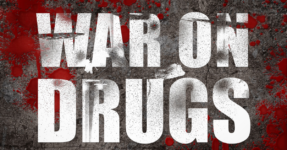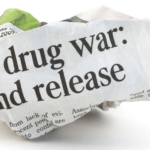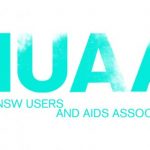NSW Fails to Embrace Harm Minimisation, Preferring to Continue the Futile War on Drugs

This week’s New South Wales Drug Summit gave many people hope that our state would finally move away from the failed war on drugs and embrace drug minimisation measures such as decriminalisation and pill testing.
But drug law reform experts presenting overwhelming evidence that the war on drugs has failed and that a move towards harm minimisation will come with enormous social and economic benefits – as it has proven to have done in many other nations – our political leaders refused to adopt measures that would see drug use treated as a health issue instead of a criminal law problem.
To add salt to the wounds of drug law reformists, the periods leading up to and following the Summit have seen the New South Wales Police Force conduct fresh ‘dial-a-dealer’ operations – charging 100 people with a range of drug offences and making it clear the ‘zero tolerance’ regime is here to stay, for the time-being at least.
Failure to Embrace Harm Minimisation, Despite Proven Benefits
Despite numerous updates, facts, and figures from progressive countries around the world that have seen ample success since decriminalising possession and purchasing of specific drugs, Australia (specifically New South Wales) will not be another country to follow suit.
Premier Chris Minns didn’t find any issues with potential disagreements at the summit, noting that not every party official or member needed to come to the same conclusion about their viewpoints on illicit substances. However, although disagreement can lead to innovative solutions, the NSW Drug Summit ended in a lack of movement that the state desperately needs to see.
One of the speakers who swayed New South Wales’ government to remain stagnant in its growth was Ted Wheeler, the Mayor of Portland, Oregon—one of the most liberal, democratic, and progressive cities in the United States. Unfortunately, Portland’s progressiveness has led to severe homelessness and a drug problem—an issue that Wheeler and other ambitious leaders used to back their narrative that decriminalisation does not work.
However, there were a few reasons why the Portland initiative did not succeed as intended and decriminalisation was reversed. The eclectic city lacked the finances and resources for treatment, care, and rehabilitation that ‘offenders’ would typically need to get back on their feet.
A second speaker who contributed to the discussions at the Drug Summit was Professor Don Weatherburn from the National Drug and Alcohol Research Centre, who addressed whether prison sentencing effectively deters drug use or possession. Statistics have shown that prosecuting people does not necessarily correlate to less drug use — hence, harsher sentencing and prison time are not effective methods that ‘curb’ drugs in society.
On the second day, the Special Commission of Inquiry backed this stance, mentioning that decriminalising drug possession and introducing drug checking services were critical to Australia’s well-being.
Similarly, health groups, like ‘Health Promotion and Wellbeing’, recommended not stopping at decriminalisation, but also adding programs and initiatives that encourage safe use, treatment, healthcare facilities, increased education, and community resources.
First Nations People Left to Fend for Themselves with Drug Use in Communities
Another reason to decriminalise drug use and possession in New South Wales is due to the over-impacted and over-represented minority groups, like First Nations people. University of Sydney professor, Teesson, stated that ‘one in four people entering treatment in this country for drug-related issues will be Aboriginal or Torres Strait Islander’, highlighting how harm minimisation and prevention strategies are critical for reducing drug use and unsafe practices in New South Wales.
First Nations individuals have long been marginalised in Australian society, receiving fewer resources and opportunities. The lack of representation of First Nations peoples in decision-making processes, such as the NSW Drug Summit, is a stark reminder of the need for more inclusive and diverse perspectives.
The Australian Institute of Health and Welfare estimated that illicit drug use is almost 1.5x high for Aboriginal people compared to other Australians, with First Nations individuals at a higher risk of harmful drug use and poly-drug use.
Drug Decriminalisation Has Worked in Other Countries — and the ACT
It seems odd that New South Wales would so quickly shut down the idea of drug decriminalisation, considering that this method has worked so well in other countries and states. Experts say intensifying enforcement by increasing police presence and drug possession/penalties only exacerbates the problem and doesn’t solve any of the core issues.
Plus, other nations, like Portugal, have found that decriminalisation and expanded rehabilitation programs have encouraged people to seek help with drug use, find resources, and suffer fewer drug-related harms and deaths. Other countries and states, like Oregon, Maine, Rhode Island, and the United States as a whole, have proposed legislation that decriminalises the personal possession of all illicit substances.
And the U.S. and Europe aren’t the only nations who are considering, or who already have, decriminalised substances — other Australian states have taken steps to reduce drug-related harms and deaths by legalising cannabis. The ACT pushed forward with its ‘bold health approach’ towards drug decriminalisation in 2023, but the NSW Labor Premier brushed aside the cry for safety.
NSW Labor MPs were disappointed that the government didn’t see the urgency in following the ACT with their progressive drug laws. Although young people are dying due to a lack of drug regulation, and minorities are highly affected — further stigmatising First Nations individuals and segregating Australia’s communities — the NSW party officials saw that there is ‘no mandate’ to follow suit with the ACT.
Is NSW Slowly Making Changes?
Despite not following the ACT’s lead when it comes to decriminalising drugs and legalising cannabis, New South Wales could slowly — very slowly — be moving towards less harsh penalties when it comes to drug use and possession, despite not embracing decriminalisation in the latest Drug Summit. In 2023, the NSW Parliament introduced a two-strike policy for those caught with small quantities of drugs. Police can issue up to two $400 fines for those caught with small amounts of drugs to reduce criminal penalties for offenders.
However, if they are moving at all, NSW is moving too sluggishly to see a real change. Health Minister Ryan Park told media that there is not enough local support for reform forcing the decriminalisation of drug use and possession, indicating that it would be a ‘seismic shift’ in how the government handles drugs in the state.
Statistics have shown that the number of drug overdose deaths in Australia has doubled in the last two decades — so, if not now, when will the government take drug-related harm and deaths seriously enough to institute decriminalisation successfully?
If the welfare and health of the people are not paramount in the current government’s mind, then other factors may contribute to the shift to decriminalisation. A study conducted showed that utilising the cannabis cautioning scheme for all drugs would reduce the cost of the current drug policy by more than 50%. Furthermore, the Australian public could have a higher trust level in the government and policing agencies if the current legislation changed — 88% of the Australian public favours decriminalisation support for cannabis, along with 74% for ecstasy, 64% for heroin, and 66% for methamphetamines.
Thus, not only could Australia financially benefit from decriminalisation, but the society as a whole could benefit. And it only starts with a few much-needed steps:
- Adoption of de jure decriminalisation of cannabis and other drugs,
- Remove criminal sanctions for noncompliance,
- Remove strict eligibility requirements and
- Remove criminal sanctions for noncompliance for de facto decriminalisation.
If the NSW Drug Summit is what the state has to go off of, then the public can’t expect any imminent changes. However, with forward-thinking countries adopting drug decriminalisation, residents of New South Wales could hope for more inclusive and rehabilitation-focused programs in the upcoming years.






